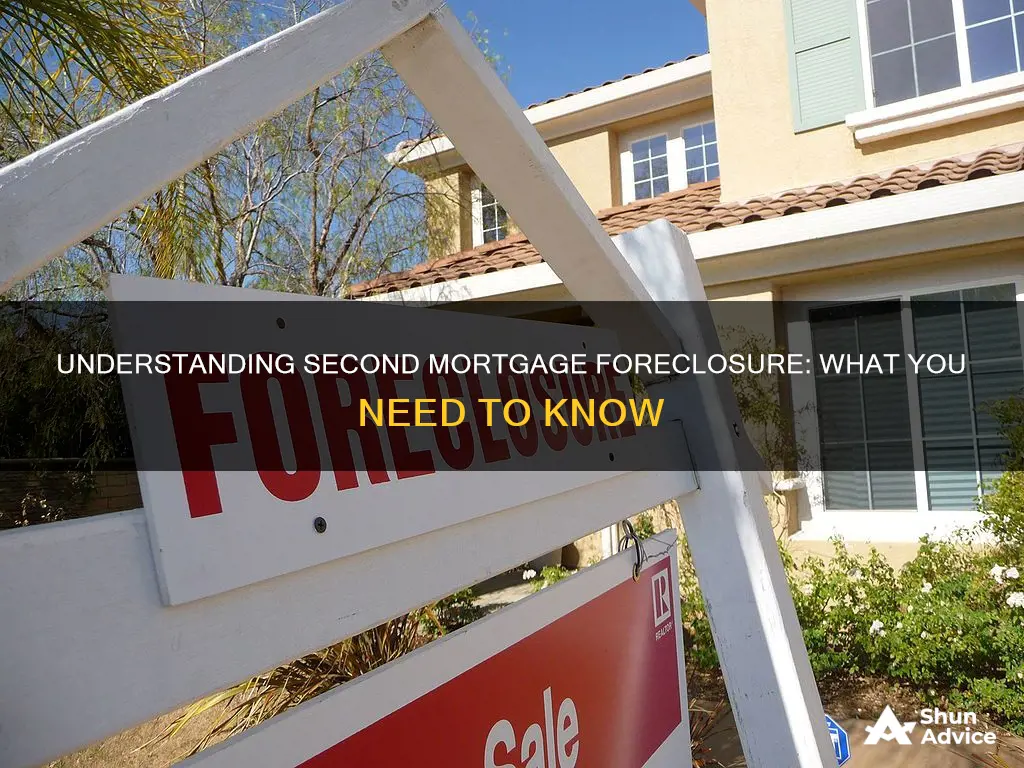
A second mortgage is a loan that allows you to borrow against your home's equity. It is a way to finance home renovations, repairs, or major expenses like college tuition. However, it comes with risks, especially if you struggle to make payments. If you default on your second mortgage, the lender can take legal action, including foreclosure. Foreclosure is the process by which the lender takes back the property if you stop making payments. While foreclosure on a second mortgage is possible, it is less common because the second lender's ability to recoup their investment depends on the amount of equity in the home. In this case, the second lender may choose to sell the debt to a collection agency or take legal action to recover the remaining debt.
How do you foreclose on a second mortgage?
| Characteristics | Values |
|---|---|
| What is a second mortgage? | A loan that lets you borrow against your home's equity |
| What is the risk? | The lender can take legal action, including foreclosure, if you default on payments |
| What if the foreclosure doesn't cover the second mortgage balance? | The lender may sue for the remaining debt |
| What is a non-recourse loan? | The lender can only collect the security on the property itself, not any deficiency balance from the borrower |
| What is a subordination agreement? | An agreement that makes a second mortgage loan junior to a refinanced first mortgage loan |
| What is a zombie second mortgage? | A defaulted loan that has been purchased by debt buyers or their agents, who can foreclose and obtain the home |
| What can you do if facing foreclosure? | Loan modification, settlement, or bankruptcy |
| What is the first step if facing foreclosure? | Consult legal and financial professionals to understand your options |
What You'll Learn
- The second mortgage lender may start foreclosure proceedings
- Foreclosure is unlikely if your home is worth less than what you owe
- Lenders don't like foreclosing as it offers a poor economic return
- A second mortgage company can foreclose even if your first mortgage is current
- Foreclosure processes vary based on personal circumstances and state laws

The second mortgage lender may start foreclosure proceedings
The second mortgage lender will only get paid after the first mortgage lender has been fully paid off. Until the first mortgage balance is paid in full, the second mortgage lender receives nothing. In some cases, the second mortgage company may voluntarily choose not to foreclose on your home because there may not be enough left for them after the sale of the home.
The second mortgage lender may also consider the equity in your home when deciding whether to start foreclosure proceedings. If your home is worth more than what you owe, the second mortgage holder may foreclose to recover their money. If your home is worth less than what you owe on your first mortgage, foreclosure is unlikely because the second lender would get little or nothing from the sale.
In some cases, the second mortgage lender may have priority over the first mortgage lender. This can happen if the first mortgage is refinanced. A subordination agreement ensures that the first mortgage keeps its priority position, even after changes to your home loan. Without this agreement, a second mortgage lender could move ahead in the repayment order, making it harder for the first mortgage holder to recover their money in a foreclosure.
Becoming a Mortgage Field Inspector: A Step-by-Step Guide
You may want to see also

Foreclosure is unlikely if your home is worth less than what you owe
Foreclosure is a stressful process, and having a second mortgage can make the situation even more complicated. When you take out a mortgage to buy a home, you sign a promissory note, promising to repay the loan, and a mortgage (or deed of trust), which gives the lender a legal claim to the property. The lender has the right to take back the property if you stop making payments.
However, foreclosure is less common when a home is worth less than what is owed, also known as being “underwater". This is because the second lender would get little to nothing from the sale. In this case, the second mortgage lender may sell the debt to a collection agency or take legal action and sue for the unpaid balance.
In some cases, the second mortgage company may voluntarily choose not to foreclose on your home because there may not be enough money left for them after the sale. There are expenses that must be paid from the proceeds of the sale, such as real estate fees and taxes. All associated fees from the sale of the home must be paid before any money can be paid towards the mortgages. Once expenses are covered, the mortgages are paid off in priority order: first mortgage, then second, etc.
If you are facing foreclosure or legal action, there are options to protect yourself, such as loan modification, settlement, or bankruptcy.
Strategies for Managing Multiple Mortgages and Financial Freedom
You may want to see also

Lenders don't like foreclosing as it offers a poor economic return
Foreclosure is a stressful and challenging event for homeowners, and lenders would also rather avoid it if possible. When a lender forecloses on a home, they incur additional expenses, and the process is often lengthy, resulting in reduced economic returns.
Firstly, the foreclosure process can be time-consuming, taking months or even years, during which the lender does not receive any payments. Secondly, when a foreclosed home is sold, there are various expenses that must be paid from the proceeds, such as real estate fees and taxes. These costs reduce the amount available to pay off the mortgages. In the case of a second mortgage, the first mortgage has priority, and until that balance is paid in full, the second mortgage lender may receive nothing.
Additionally, lenders may face challenges in selling the property at a price that covers the loan balance. If the property is sold at a loss, the lender may not recover the full value of the loan, resulting in a poor economic return. Furthermore, if the homeowner chooses to fight the foreclosure in court, the legal proceedings can be costly and time-consuming for the lender.
To avoid foreclosure, lenders may be more willing to negotiate with borrowers and explore alternative solutions. For example, borrowers can contact a housing counselor or apply for forbearance programs to temporarily postpone their payment obligations. In some cases, lenders may also accept a short sale, where the homeowner sells the property for less than the loan balance, as it can still result in a higher financial recovery for the lender compared to foreclosure.
Mortgages: Primary Residence Determinants and Their Impact
You may want to see also

A second mortgage company can foreclose even if your first mortgage is current
A second mortgage is a loan that allows homeowners to borrow against the equity they've built in their property. It is a junior lien, which means it is second in line to be repaid if the home is foreclosed. As a result, it often comes with a higher interest rate than the first mortgage loan. The amount you can borrow with a second mortgage depends on the equity in your home.
If you default on your second mortgage, the lender can take legal action, including foreclosure. However, this is less common if your home is worth less than what you owe, as the second lender would get little to nothing from the sale. In such cases, the second mortgage lender may sell the debt to a collection agency or sue you for the remaining debt.
The foreclosure process varies from state to state, but it usually takes between two to eighteen months. Generally, if mortgage payments are not received within 150 days, the bank can proceed with the foreclosure. If the second mortgage holder forecloses, the first mortgage holder may also choose to foreclose to protect their rights. Alternatively, the first and second mortgage holders may negotiate a deal where one buys the interest in the property from the other.
If you are facing foreclosure, there are options to protect yourself, such as loan modification, settlement, or bankruptcy. You may also be able to structure a repayment plan or a forbearance plan to suspend or reduce payments for a specified length of time.
Mortgage Pre-Qualification: Dual Processing for a Smooth Approval
You may want to see also

Foreclosure processes vary based on personal circumstances and state laws
Foreclosure processes can vary depending on an individual's circumstances and the laws of the state in which they reside. In general, foreclosure is a legal process that occurs when a borrower misses a certain number of payments. The lender then moves forward with taking ownership of the home to recoup the money lent. This process can look different depending on the state. For example, in Colorado, to proceed with a non-judicial foreclosure, a lender must mail a borrower a notice containing Colorado's foreclosure hotline telephone number, contact information for loss mitigation, and a statement regarding foreclosure consultant fees, at least 30 days before filing a Notice of Election and Demand (NED). In contrast, in Kansas, a judicial foreclosure requires the lender to file a complaint with the court and serve it to the borrower, along with a summons.
The length of time between the sale of a home and the move-out date for the former homeowners also varies depending on state law. In some states, individuals may have only a few days to move out, while in others, the timeline for moving out after foreclosure could be months. Additionally, some states allow for a redemption period after the sale, during which the previous homeowner has the possibility of reclaiming their home by making all outstanding mortgage payments and paying any fees that accrued during the foreclosure process.
The type of mortgage also plays a role in the foreclosure process. For example, a second mortgage company can foreclose on a home, even if the first mortgage is current. However, foreclosure on a second mortgage is less common, as the lender will only get paid if there is enough equity in the home. If the home is worth less than what is owed on the first mortgage, the second mortgage lender may instead sell the debt to a collection agency or sue the borrower for the unpaid balance.
Annuity Applications: Solving Mortgage Problems
You may want to see also
Frequently asked questions
Yes, a second mortgage company can foreclose on your home. The second mortgage lender may start foreclosure proceedings, but this is less common since they only get paid if there is enough equity in the home.
You could qualify for a forbearance, repayment plan, or loan modification. You can also file for bankruptcy, which allows a business to reorganise its debts and continue operating while paying off its creditors.
If foreclosure doesn't cover your second mortgage balance, the lender may sue you for the remaining debt.







